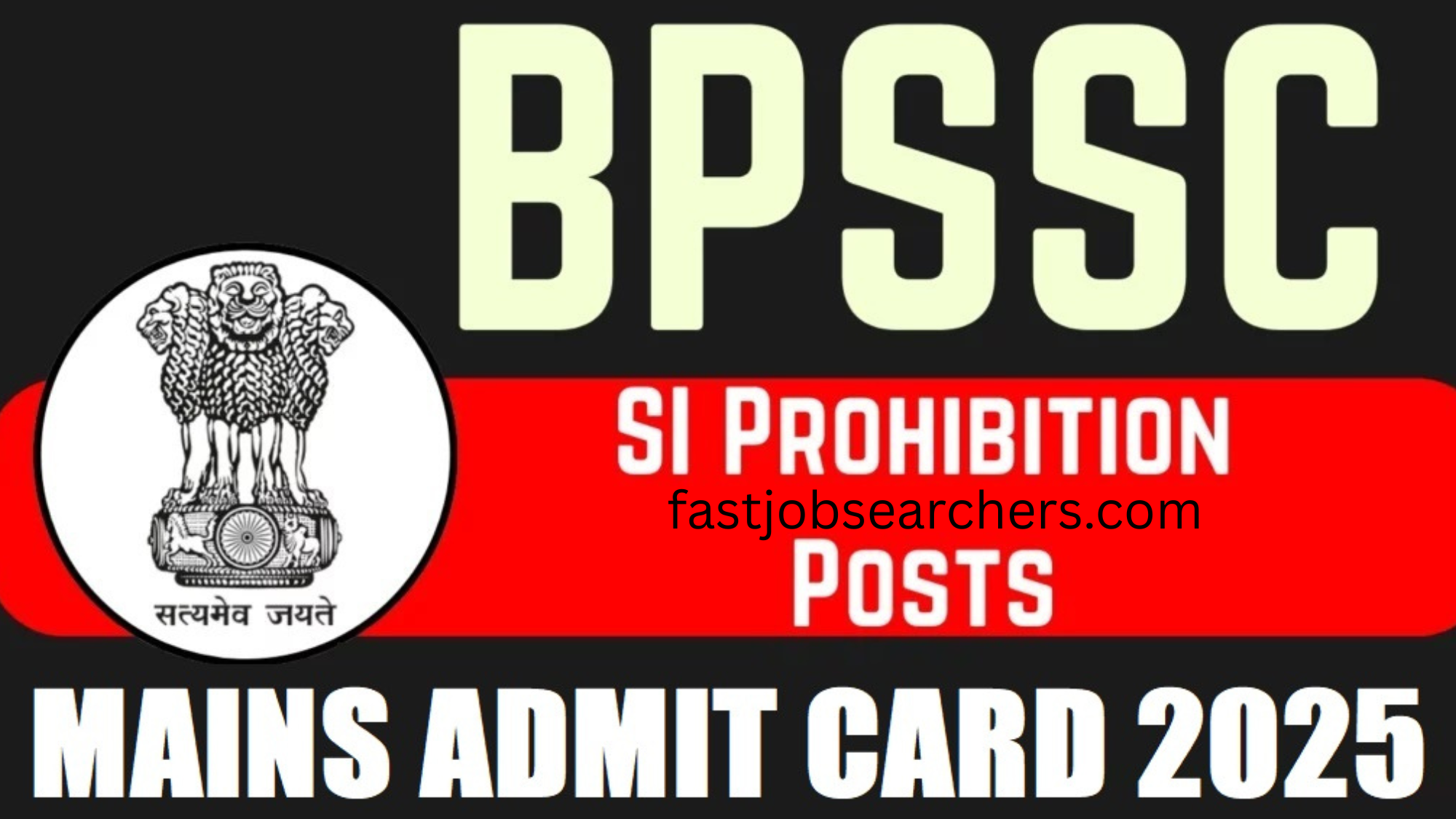The Bihar Police Subordinate Services Commission has released the admit card for the Sub‑Inspector Prohibition Mains examination for the year. This marks a significant milestone for candidates who cleared the preliminary stages and are preparing to take the next step toward joining the prohibition enforcement cadre. The release of this hall ticket is the gateway to the main written examination and signifies the official progression of the selection process.
In this article, we explore every essential aspect related to this development. We’ll detail how to download the admit card, key instructions for candidates preparing for the examination, an overview of the expected exam structure, the importance of compliance with examination regulations, what to bring on the day, and recommended preparations. The aim is to guide aspirants smoothly into their next phase of selection and help streamline their final preparation efforts.
Significance of the Admit Card Release
Issuing the admit card is a critical moment in any recruitment process. For candidates aspiring to become Sub‑Inspectors in prohibition enforcement, this document serves as their entry pass to the examination center. It validates that they have cleared earlier stages and are officially eligible to appear in the main exam.
The admit card also contains vital information including the candidate’s name, roll number, examination center, date and time, reporting schedule, and essential guidelines. It acts as an identity verification document at the venue. Issuing this card well ahead of the exam helps candidates plan logistics, prepare mentally, and confirm all details are accurate.
Candidates who notice any discrepancy should contact the official commission immediately to seek resolution and avoid last‑minute complications. Ensuring the admit card is downloaded and preserved properly is fundamental to avoid any entry denial.
How to Download the Admit Card
Access to the admit card is provided through the official commission’s portal. Candidates can download it by entering their application identifiers. After downloading, the document should be printed on clean A4 paper, ensuring clarity of text and visibility of the photograph.
Once the document is printed, candidates should store it safely until the examination day. It is also wise to keep additional photocopies as backup, along with a digital version saved offline. Double‑checking all printed details—such as spellings, examination center location, and personal information—is recommended.
Preparing in advance reduces the risk of encountering technical issues or printer glitches at the eleventh hour. Having a clear, accessible copy contributes to a smooth entry process at the examination center.
Important Guidelines and Instructions
The admit card includes instructions that must be followed closely. Candidates are required to report at the center within the specified time window. Late arrivals can result in forfeiting the exam opportunity altogether. They must bring along a valid form of photo identity, such as an official government‑issued ID, alongside the admit card.
Any candidate appearing without both the admit card and valid ID may not be allowed entry. Additionally, clear photocopies of ID documents may be requested. The guidelines prohibit electronic devices inside exam halls, including mobile phones, calculators, smartwatches, or digital accessories. Candidates are expected to follow seating plans and instructions from invigilators without hesitation.
Other behavioral norms and dress code expectations are outlined as well. Candidates should dress modestly and without any prohibited insignia or items. Strict adherence to all guidelines ensures fair conduct and maintains the integrity of the examination process.
Anticipated Exam Structure and Format
While the main examination pattern is officially detailed in the notification or syllabus document, candidates generally face a comprehensive written test covering a range of subjects related to prohibition laws, general awareness, logical reasoning, language comprehension, and legal provisions. The exam may include multiple‑choice questions, situation‑based scenarios, and essay‑style responses to assess analytical abilities and domain knowledge.
Registrants should review the official syllabus thoroughly and ensure balanced preparation across all topics. Previous years’ sample papers are valuable tools for familiarizing oneself with question styles and time management. Mastering speed and accuracy under timed conditions can significantly improve performance.
Recommended Preparation Strategy
Candidates are encouraged to adopt a disciplined study routine focused on concept clarity and regular revision. A structured plan helps to cover all relevant topics while incorporating practice tests to simulate the pressure of the examination environment.
Reading materials and study guides specific to prohibition law and enforcement protocols can offer targeted insights. Regular brushing up on current affairs, national legal developments, and local prohibition measures helps build a well-rounded preparation. Accessing earlier paper patterns and practicing mock tests improves confidence.
It is also beneficial to maintain physical and mental wellness during this preparatory phase. Brief relaxation techniques, scheduled breaks, and consistent rest support stamina and focus, especially in the final days leading to the exam.
What to Expect on Exam Day
On the day of the exam, candidates should arrive early at the assigned center dressed in compliance with the guidelines. They must carry the printed admit card, original photo ID and at least one photocopy, along with any items specified by the commission (such as transparent water bottles). Entry to the center typically begins an hour before the exam time; attendance will be documented via biometric or manual verification.
Inside the hall, candidates will receive sealed question sheets or admit card pouches alongside answer sheets. They must verify their name, roll number, and center code before starting. Invigilators will provide instructions on marking responses and handling rough sheets or OMR procedures. Candidates should focus on question instructions and manage their time effectively during the exam.
Any misconduct or violation of exam rules, such as possession of unauthorized materials or copying behavior, may lead to disqualification. It is essential to maintain decorum and transparency to ensure the process remains fair for all.
Frequently Asked Questions
What is the BPSSC SI Prohibition Mains exam?
This is the second stage of the recruitment process for the post of Sub-Inspector (Prohibition) conducted by the Bihar Police Subordinate Services Commission. It follows the preliminary exam and is an essential step toward final selection.
Who is eligible to appear for the mains exam?
Only candidates who have successfully cleared the preliminary exam are eligible to appear for the mains examination. The eligibility is based on performance in the previous stage and verification of basic criteria.
How can candidates download the admit card?
Candidates can download their admit card from the official website of the commission using their application details, such as registration ID and password or date of birth.
What documents must be carried to the exam center?
Candidates must carry a printed copy of the admit card along with a valid government-issued photo ID. It is advisable to carry an extra photocopy of the ID for safety.
Can changes be made if there is an error on the admit card?
If any incorrect information is found on the admit card, candidates should immediately contact the commission through the official helpline or email to get it corrected before the examination day.
What happens if a candidate forgets the admit card on exam day?
Without the admit card, entry to the examination center is generally not allowed. It is crucial to keep the document safe and carry it along with required identification.
What items are not allowed inside the exam hall?
Electronic gadgets like mobile phones, smartwatches, calculators, Bluetooth devices, and any kind of study material or written notes are strictly prohibited in the examination hall.
How should a candidate prepare in the days leading up to the exam?
In the final days, candidates should focus on revision, take practice tests, rest properly, and remain calm. Time management, accuracy, and confidence are key elements for success.
Is the mains exam the final stage of the recruitment?
The mains exam is followed by further stages such as physical efficiency tests and document verification. Final selection is based on the overall performance across all stages.
Conclusion
The release of the BPSSC SI Prohibition Mains Admit Card is a pivotal moment for all aspirants who have successfully advanced beyond the preliminary examination. It marks the transition from one critical phase to another and reflects the candidate’s steady progress toward a meaningful and respected role in public service.




